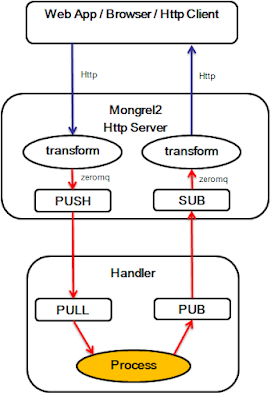There are already some articles talking about Handler and how to get started, for instance:
http://www.ioncannon.net/programming/1384/example-mongrel2-handler-in-ruby/
http://brubeck.io/demos.html
I almost studied 2 days to understand the usage of handler and try a simple handler to respond the request, and finally I finished. So, in this article, I will give a concept about Mongrel2 web server and a simple example.
- From this diagram, you will quickly realize how the mongrel2 web server works with your handler by what kind of zeromq communication type.
- Second, I will give the handler example in details:
brubeck_handler = Handler(
send_spec='tcp://127.0.0.1:9999',
send_ident='34f9ceee-cd52-4b7f-b197-88bf2f0ec378',
recv_spec='tcp://127.0.0.1:9998',
recv_ident='')
media_dir = Dir(
base='media/',
index_file='index.html',
default_ctype='text/plain')
brubeck_host = Host(
name="localhost",
routes={
'/media/': media_dir,
'/handlers': brubeck_handler})
brubeck_serv = Server(
uuid="f400bf85-4538-4f7a-8908-67e313d515c2",
access_log="/log/mongrel2.access.log",
error_log="/log/mongrel2.error.log",
chroot="./",
default_host="localhost",
name="brubeck test",
pid_file="/run/mongrel2.pid",
port=6767,
hosts = [brubeck_host]
)
settings = { "zeromq.threads": 1 }
servers = [brubeck_serv]
Load the conf file to mongrel2
> m2sh load -config mongrel2.conf -db the.db
Run the mongrel2 web server
> m2sh start -db the.db -host localhost
Run the simple handler source code ( in Python ) ==> simple_handler.py
> python simple_handler.py
#!/usr/bin/env python
import zmq
ctx = zmq.Context()
pull = ctx.socket(zmq.PULL)
pull.connect("tcp://127.0.0.1:9999")
pub = ctx.socket(zmq.PUB)
pub.connect("tcp://127.0.0.1:9998")
while True:
msg = pull.recv()
print msg
sender_uuid, client_id, request_path, request_message = msg.split(" ", 4)
ret_content = "Hi...This is Danny..."
ret_msg = '%s 1:%s, HTTP/1.1 200 OK\r\nContent-Length: %d\r\n\r\n%s' %
(sender_uuid, client_id , ret_content.__len__(), ret_content)
pub.send(ret_msg, 0)
Use curl to test it and will get the result as follows:
> curl http://localhost:6767/handlers
Hi...This is Danny...

2 comments:
Awesome! So simple and complete example! Love it! Thanks!
Thank you, Thomas.
Post a Comment